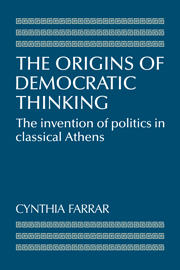Book contents
- Frontmatter
- Contents
- Dedication
- Preface
- 1 Ancient reflections: a force for us
- 2 Order in autonomy: the ungoverned cosmos and the democratic community
- 3 Protagoras: measuring man
- 4 Man's measurings: cosmos and community
- 5 Thucydides: reflecting history – man and the community
- 6 Democritus: reflecting man – the individual and the cosmos
- 7 Living democracy?
- Bibliography
- Indexes
1 - Ancient reflections: a force for us
Published online by Cambridge University Press: 23 October 2009
- Frontmatter
- Contents
- Dedication
- Preface
- 1 Ancient reflections: a force for us
- 2 Order in autonomy: the ungoverned cosmos and the democratic community
- 3 Protagoras: measuring man
- 4 Man's measurings: cosmos and community
- 5 Thucydides: reflecting history – man and the community
- 6 Democritus: reflecting man – the individual and the cosmos
- 7 Living democracy?
- Bibliography
- Indexes
Summary
Democracy was cobbled together, thousands of years ago, by the Athenians. It was at Athens, too, that political theory first appeared. The citizens of fifth-century B.C. Athens lived democracy, for the first time in the history of the world, and they thought about it. Democratic politics enabled all citizens, rich and poor, to express and pursue their own aims. Democratic politics also prompted citizens to construe their aims politically, and to reflect on their actions in terms of general, relatively abstract considerations. Political theory was part of democratic politics; self-understanding was political. This dynamic synthesis of the concrete and the reflective was a striking achievement – so striking, indeed, as to be practically unintelligible from a modern perspective. Modern thinkers have tended to see the Athenians as mired in the concreteness of a communal, stratified, and in some sense primitive existence, immune to the claims of political reflection that exalt and afflict us. On the assumption that political theory must be abstract, scholars have denied or ignored the existence of a democratic political theory in fifth-century Athens, reserving the title of ‘first theorists’ to those undemocratic and politically alienated thinkers, Plato and Aristotle.
- Type
- Chapter
- Information
- The Origins of Democratic ThinkingThe Invention of Politics in Classical Athens, pp. 1 - 14Publisher: Cambridge University PressPrint publication year: 1988



